Starter Units Period 1 小初衔接——初中英语怎么学?课件(共49张PPT无素材)
文档属性
| 名称 | Starter Units Period 1 小初衔接——初中英语怎么学?课件(共49张PPT无素材) | 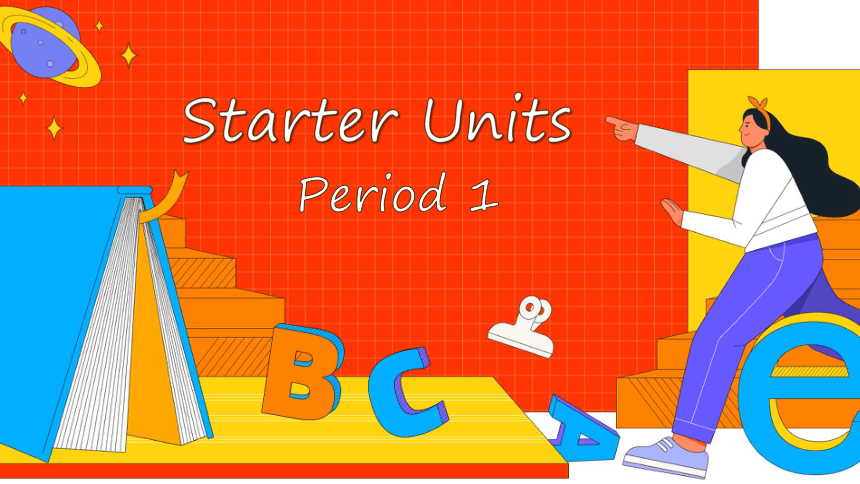 | |
| 格式 | pptx | ||
| 文件大小 | 8.3MB | ||
| 资源类型 | 教案 | ||
| 版本资源 | 人教新目标(Go for it)版 | ||
| 科目 | 英语 | ||
| 更新时间 | 2022-08-23 18:22:25 | ||
图片预览


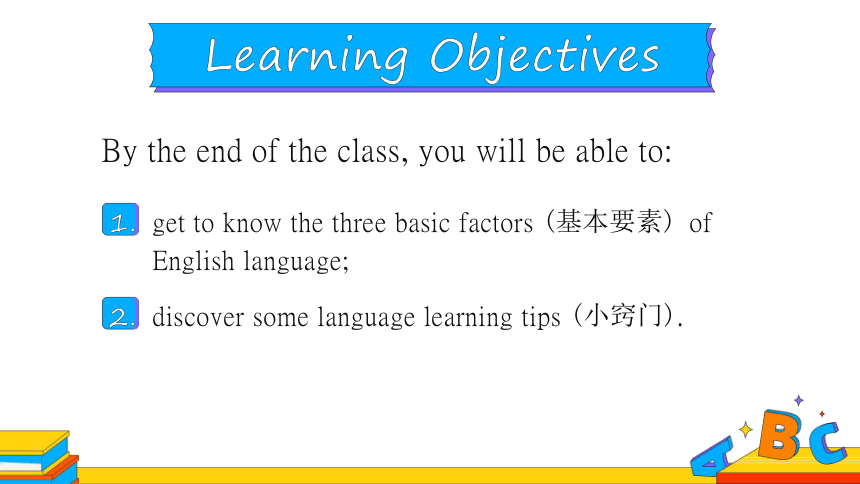
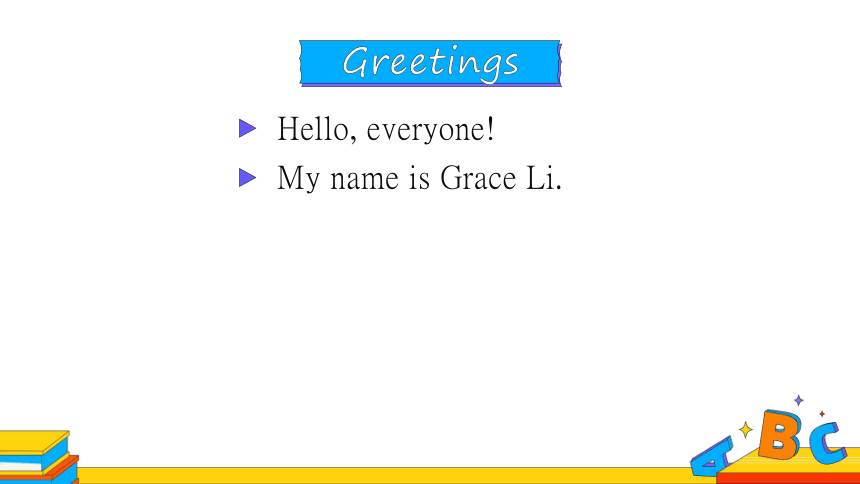
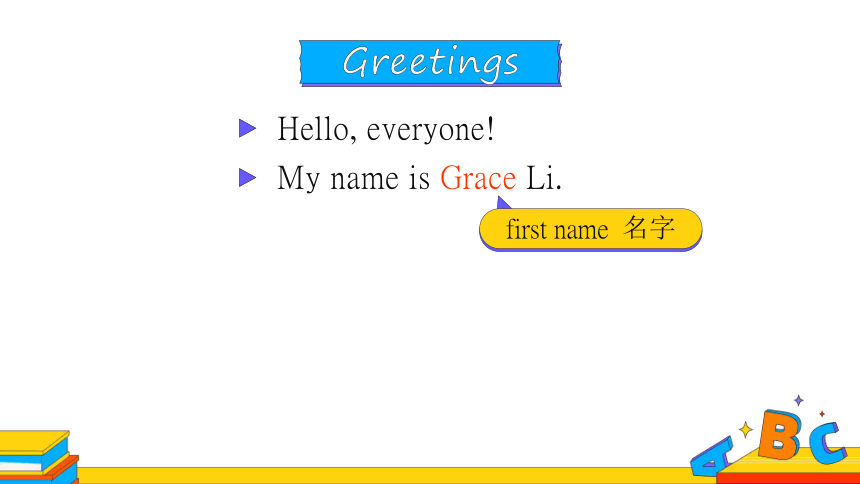
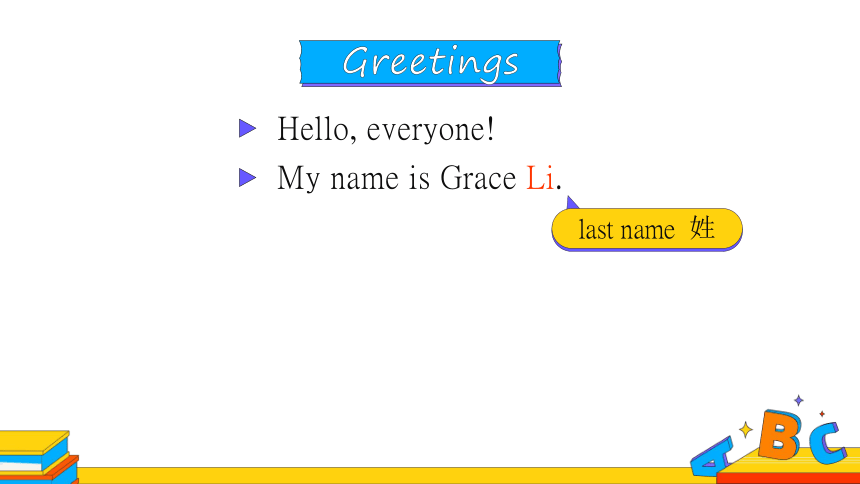
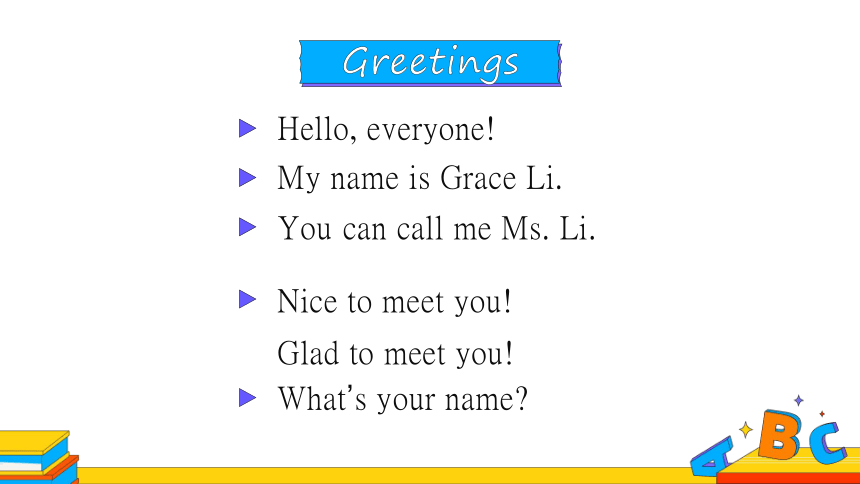
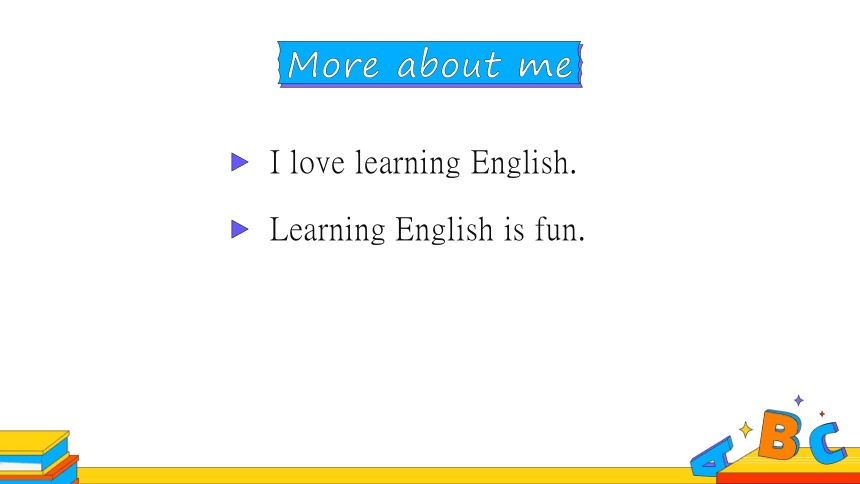
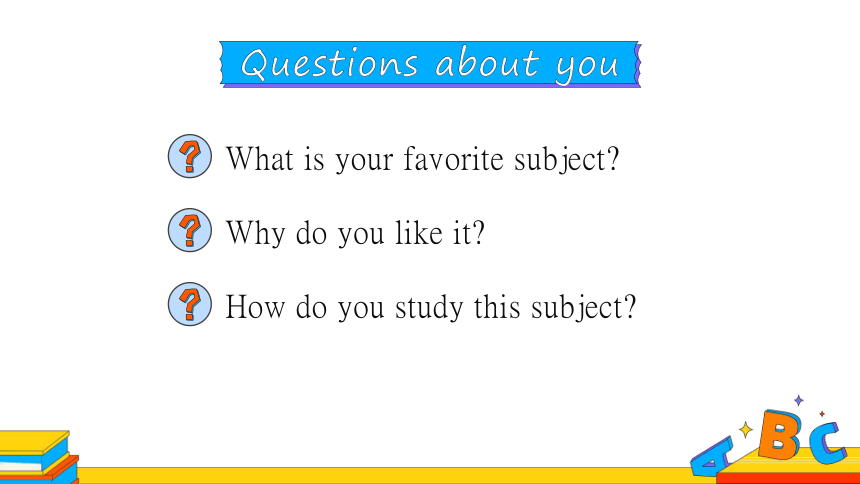
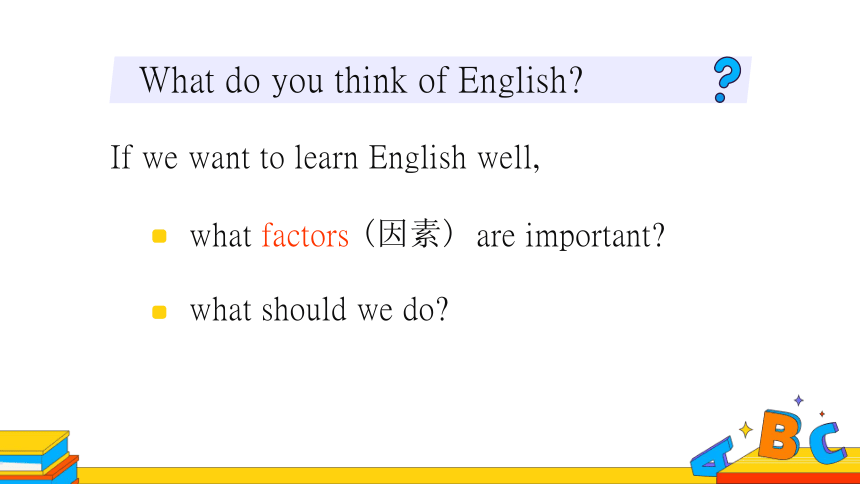
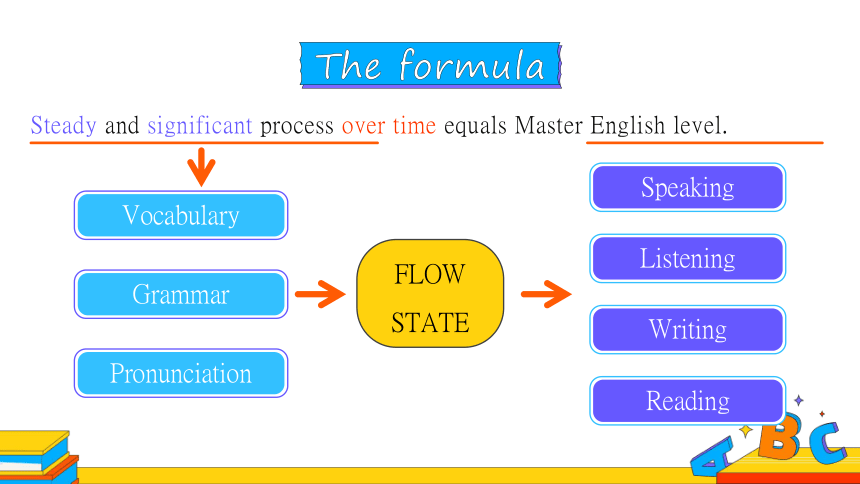
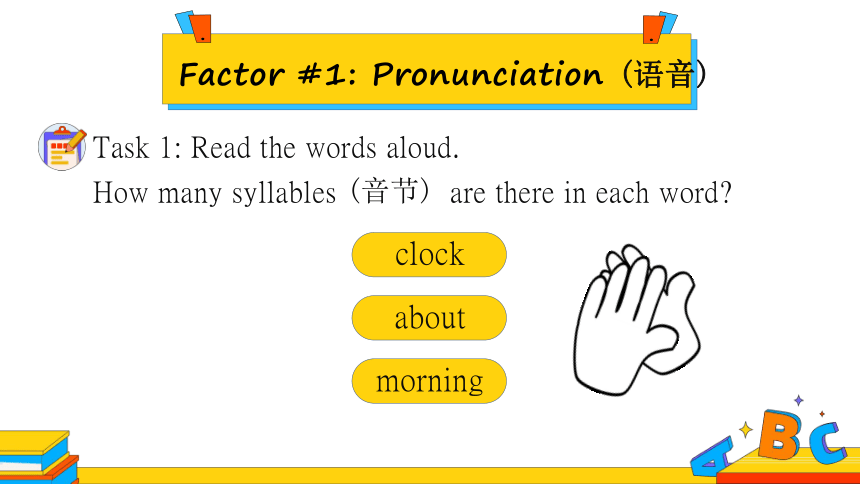
文档简介
(共49张PPT)
Starter Units
Period 1
第一课时:小初衔接——初中英语怎么学?
Learning Objectives
By the end of the class, you will be able to:
1.
get to know the three basic factors (基本要素) of English language;
2.
discover some language learning tips (小窍门).
Greetings
My name is Grace Li.
Hello, everyone!
Greetings
My name is Grace Li.
Hello, everyone!
first name 名字
Greetings
My name is Grace Li.
Hello, everyone!
last name 姓
Greetings
My name is Grace Li.
You can call me Ms. Li.
Nice to meet you!
What’s your name
Hello, everyone!
Glad to meet you!
More about me
Learning English is fun.
I love learning English.
Questions about you
What is your favorite subject
Why do you like it
How do you study this subject
If we want to learn English well,
what should we do
what factors (因素) are important
What do you think of English
The formula
Steady and significant process over time equals Master English level.
Grammar
Vocabulary
Pronunciation
Reading
Listening
Writing
Speaking
FLOW
STATE
clock
about
morning
Factor #1: Pronunciation (语音)
How many syllables (音节) are there in each word
Task 1: Read the words aloud.
clock
about
morning
Factor #1: Pronunciation (语音)
How many syllables (音节) are there in each word
Task 1: Read the words aloud.
How many syllables (音节) are there in each word
clock
about
morning
Factor #1: Pronunciation (语音)
Task 1: Read the words aloud.
Which syllables are stressed (重读的)
clock
about
morning
Factor #1: Pronunciation (语音)
Task 1: Read the words aloud again.
Task 2: Read the words, phrases and sentences aloud.
Feel the change in rhythm (节奏) and stress (重读).
Factor #1: Pronunciation (语音)
mother
found it
It hurts.
Phrases:
Words:
Sentences:
attend
get up
Pay them.
Do it.
I did.
Factor #1: Pronunciation (语音)
Task 3: Read the sentences aloud.
I go to bed at about nine o’clock.
I get up at about seven o’clock in the morning.
1. Where do you pause (停顿)
Factor #1: Pronunciation (语音)
Task 3: Read the sentences aloud.
I go to bed at about nine o’clock.
I get up at about seven o’clock in the morning.
1. Where do you pause (停顿)
Factor #1: Pronunciation (语音)
Task 3: Read the sentences aloud.
I go to bed at about nine o’clock.
I get up at about seven o’clock in the morning.
1. Where do you pause (停顿)
Factor #1: Pronunciation (语音)
Task 3: Read the sentences aloud.
I go to bed at about nine o’clock.
I get up at about seven o’clock in the morning.
2. Which syllables are stressed (重读的)
Pay attention to the stress (重读) and rhythm (节奏).
Factor #1: Pronunciation (语音)
Task 4: Read the sentences aloud.
I want a soda.
I think he’s got it.
We took a vacation.
I went to the station.
Learning tip one
Listening is the first step.
I often listen to a story before reading it. Just like when my little brother learns to talk, he hears it first, and then tries to repeat it.
Learning tip one
Listening is the first step.
Listen to English for twenty minutes every day.
1
As you listen, follow and repeat what you hear.
2
T
I
M
E
FOCUSED
LEARNING
(专注学习)
PRACTICE
(操练)
PASSIVE
EXPOSURE
(被动接触)
Task 1: Write down as many words as you know.
Factor #2: Vocabulary (词汇)
Each word must be an action (动作).
cook
play
run
swim
read
laugh
sleep
bark
moo
oink
Task 2: Look for action words in the word cloud.
Factor #2: Vocabulary (词汇)
jacket
red
please
purple
map
key
ruler
fine
black
can
orange
English
good
say
now
color
spell
blue
brown
afternoon
evening
cup
hello
see
morning
yellow
white green
thanks
pen
thanks
Task 2: Look for action words in the word cloud.
Factor #2: Vocabulary (词汇)
jacket
red
please
purple
map
key
ruler
fine
black
can
orange
English
good
say
now
color
spell
blue
brown
afternoon
evening
cup
hello
see
morning
yellow
white green
thanks
pen
thanks
Average vocabulary size
Age
— Reads “lots”
Average English native speaker vocab by age and overall reading habit (20,168 responses)
— Reads “somewhat”
— Reads “not much”
Learning tip two
Read after you have listened to something.
1
You can use pictures to guess, make notes, re-read ...
2
Read a lot. Read more.
Read anything that interests you: stories, news, classics ...
3
What can we read
Click to edit Master title style
Click to edit Master subtitle style
From the beginning of time, a rock had sat high on top of a mountain. The sun, the moon, Heaven and Earth all worked their magic on the rock. One day the rock split open. Inside was a monkey.
From the beginning of time, a rock had sat high on top of a mountain. The sun, the moon, Heaven and Earth all worked their magic on the rock. One day the rock split open. Inside was a monkey.
rock 石头
From the beginning of time, a rock had sat high on top of a mountain. The sun, the moon, Heaven and Earth all worked their magic on the rock. One day the rock split open. Inside was a monkey.
mountain 山
rock 石头
From the beginning of time, a rock had sat high on top of a mountain. The sun, the moon, Heaven and Earth all worked their magic on the rock. One day the rock split open. Inside was a monkey.
monkey 猴子
mountain 山
rock 石头
What do we call action words
1.
Let’s play.
2.
Who cooks in your family
3.
We like reading.
4.
She is swimming.
5.
Please read (a book) to me.
Rule: Every sentence must have one verb.
Factor #3: Grammar (语法)
verb 动词
动词原形
动词第三人称单数
动名词
现在进行时
及物、不及物动词
There are other types of words, too.
Interjection
Noun
Preposition
Verb
Adjective
Pronoun
English
Types
Grammar
Adverb
Conjunction
Parts-of-speech
Language
Factor #3: Grammar (语法)
实词
I help you.
Who receives the action
action
Who does the action
宾
谓
主
Factor #3: Grammar (语法)
Is Chinese sentence structure the same
Rules are the bridge (桥梁) between input (输入) and output (输出).
I learn the rules from hearing people talk and read. Then I try using them when I speak.
Learning tip three
Discover the rules by thinking and comparing.
1
Remember the rules by lots of examples.
2
Keep practicing when speaking and writing.
3
Learning tip three
Rules are the bridge (桥梁) between input (输入) and output (输出).
More tips
Neat handwriting (工整的字迹) is encouraged (被鼓励的).
1.
Use correct capitalization (大写), spacing (空格), punctuation (标点), indents (缩进), etc.
2.
Write as clearly as you can.
1.
It’s OK to make mistakes.
2.
Correct them on time.
3.
Try not to make the same mistakes again!
More tips
Learn from mistakes (错误).
The secrets of learning a new language
学习一门新语言的秘密
Methods (方法): use effective methods.
System (机制): make it a daily habit.
Patience (耐心): keep working on it for years.
Passion (热情): find something you love.
Pronunciation, vocabulary, and grammar are the basic factors in English.
1.
Listen and read as much as possible to imitate the pronunciation, pick up vocabulary, and see how rules are applied. Speak and write to practice.
2.
Pay attention to your handwriting and correct mistakes on time.
3.
Summary
Hope you enjoy middle school English!
Goodbye!
Starter Units
Period 1
第一课时:小初衔接——初中英语怎么学?
Learning Objectives
By the end of the class, you will be able to:
1.
get to know the three basic factors (基本要素) of English language;
2.
discover some language learning tips (小窍门).
Greetings
My name is Grace Li.
Hello, everyone!
Greetings
My name is Grace Li.
Hello, everyone!
first name 名字
Greetings
My name is Grace Li.
Hello, everyone!
last name 姓
Greetings
My name is Grace Li.
You can call me Ms. Li.
Nice to meet you!
What’s your name
Hello, everyone!
Glad to meet you!
More about me
Learning English is fun.
I love learning English.
Questions about you
What is your favorite subject
Why do you like it
How do you study this subject
If we want to learn English well,
what should we do
what factors (因素) are important
What do you think of English
The formula
Steady and significant process over time equals Master English level.
Grammar
Vocabulary
Pronunciation
Reading
Listening
Writing
Speaking
FLOW
STATE
clock
about
morning
Factor #1: Pronunciation (语音)
How many syllables (音节) are there in each word
Task 1: Read the words aloud.
clock
about
morning
Factor #1: Pronunciation (语音)
How many syllables (音节) are there in each word
Task 1: Read the words aloud.
How many syllables (音节) are there in each word
clock
about
morning
Factor #1: Pronunciation (语音)
Task 1: Read the words aloud.
Which syllables are stressed (重读的)
clock
about
morning
Factor #1: Pronunciation (语音)
Task 1: Read the words aloud again.
Task 2: Read the words, phrases and sentences aloud.
Feel the change in rhythm (节奏) and stress (重读).
Factor #1: Pronunciation (语音)
mother
found it
It hurts.
Phrases:
Words:
Sentences:
attend
get up
Pay them.
Do it.
I did.
Factor #1: Pronunciation (语音)
Task 3: Read the sentences aloud.
I go to bed at about nine o’clock.
I get up at about seven o’clock in the morning.
1. Where do you pause (停顿)
Factor #1: Pronunciation (语音)
Task 3: Read the sentences aloud.
I go to bed at about nine o’clock.
I get up at about seven o’clock in the morning.
1. Where do you pause (停顿)
Factor #1: Pronunciation (语音)
Task 3: Read the sentences aloud.
I go to bed at about nine o’clock.
I get up at about seven o’clock in the morning.
1. Where do you pause (停顿)
Factor #1: Pronunciation (语音)
Task 3: Read the sentences aloud.
I go to bed at about nine o’clock.
I get up at about seven o’clock in the morning.
2. Which syllables are stressed (重读的)
Pay attention to the stress (重读) and rhythm (节奏).
Factor #1: Pronunciation (语音)
Task 4: Read the sentences aloud.
I want a soda.
I think he’s got it.
We took a vacation.
I went to the station.
Learning tip one
Listening is the first step.
I often listen to a story before reading it. Just like when my little brother learns to talk, he hears it first, and then tries to repeat it.
Learning tip one
Listening is the first step.
Listen to English for twenty minutes every day.
1
As you listen, follow and repeat what you hear.
2
T
I
M
E
FOCUSED
LEARNING
(专注学习)
PRACTICE
(操练)
PASSIVE
EXPOSURE
(被动接触)
Task 1: Write down as many words as you know.
Factor #2: Vocabulary (词汇)
Each word must be an action (动作).
cook
play
run
swim
read
laugh
sleep
bark
moo
oink
Task 2: Look for action words in the word cloud.
Factor #2: Vocabulary (词汇)
jacket
red
please
purple
map
key
ruler
fine
black
can
orange
English
good
say
now
color
spell
blue
brown
afternoon
evening
cup
hello
see
morning
yellow
white green
thanks
pen
thanks
Task 2: Look for action words in the word cloud.
Factor #2: Vocabulary (词汇)
jacket
red
please
purple
map
key
ruler
fine
black
can
orange
English
good
say
now
color
spell
blue
brown
afternoon
evening
cup
hello
see
morning
yellow
white green
thanks
pen
thanks
Average vocabulary size
Age
— Reads “lots”
Average English native speaker vocab by age and overall reading habit (20,168 responses)
— Reads “somewhat”
— Reads “not much”
Learning tip two
Read after you have listened to something.
1
You can use pictures to guess, make notes, re-read ...
2
Read a lot. Read more.
Read anything that interests you: stories, news, classics ...
3
What can we read
Click to edit Master title style
Click to edit Master subtitle style
From the beginning of time, a rock had sat high on top of a mountain. The sun, the moon, Heaven and Earth all worked their magic on the rock. One day the rock split open. Inside was a monkey.
From the beginning of time, a rock had sat high on top of a mountain. The sun, the moon, Heaven and Earth all worked their magic on the rock. One day the rock split open. Inside was a monkey.
rock 石头
From the beginning of time, a rock had sat high on top of a mountain. The sun, the moon, Heaven and Earth all worked their magic on the rock. One day the rock split open. Inside was a monkey.
mountain 山
rock 石头
From the beginning of time, a rock had sat high on top of a mountain. The sun, the moon, Heaven and Earth all worked their magic on the rock. One day the rock split open. Inside was a monkey.
monkey 猴子
mountain 山
rock 石头
What do we call action words
1.
Let’s play.
2.
Who cooks in your family
3.
We like reading.
4.
She is swimming.
5.
Please read (a book) to me.
Rule: Every sentence must have one verb.
Factor #3: Grammar (语法)
verb 动词
动词原形
动词第三人称单数
动名词
现在进行时
及物、不及物动词
There are other types of words, too.
Interjection
Noun
Preposition
Verb
Adjective
Pronoun
English
Types
Grammar
Adverb
Conjunction
Parts-of-speech
Language
Factor #3: Grammar (语法)
实词
I help you.
Who receives the action
action
Who does the action
宾
谓
主
Factor #3: Grammar (语法)
Is Chinese sentence structure the same
Rules are the bridge (桥梁) between input (输入) and output (输出).
I learn the rules from hearing people talk and read. Then I try using them when I speak.
Learning tip three
Discover the rules by thinking and comparing.
1
Remember the rules by lots of examples.
2
Keep practicing when speaking and writing.
3
Learning tip three
Rules are the bridge (桥梁) between input (输入) and output (输出).
More tips
Neat handwriting (工整的字迹) is encouraged (被鼓励的).
1.
Use correct capitalization (大写), spacing (空格), punctuation (标点), indents (缩进), etc.
2.
Write as clearly as you can.
1.
It’s OK to make mistakes.
2.
Correct them on time.
3.
Try not to make the same mistakes again!
More tips
Learn from mistakes (错误).
The secrets of learning a new language
学习一门新语言的秘密
Methods (方法): use effective methods.
System (机制): make it a daily habit.
Patience (耐心): keep working on it for years.
Passion (热情): find something you love.
Pronunciation, vocabulary, and grammar are the basic factors in English.
1.
Listen and read as much as possible to imitate the pronunciation, pick up vocabulary, and see how rules are applied. Speak and write to practice.
2.
Pay attention to your handwriting and correct mistakes on time.
3.
Summary
Hope you enjoy middle school English!
Goodbye!
同课章节目录
- starters 预备篇(2012秋审查)
- Unit 1 Good morning !
- Unit 2 What’s this in English?
- Unit 3 What color is it ?
- Unit 1 My name's Gina.
- Section A
- Section B
- Unit 2 This is my sister.
- Section A
- Section B
- Unit 3 Is this your pencil?
- Section A
- Section B
- Unit 4 Where's my schoolbag?
- Section A
- Section B
- Unit 5 Do you have a soccer ball?
- Section A
- Section B
- Unit 6 Do you like bananas?
- Section A
- Section B
- Unit 7 How much are these socks?
- Section A
- Section B
- Unit 8 When is your birthday?
- Section A
- Section B
- Unit 9 My favorite subject is science.
- Section A
- Section B
